National Conference on Jal Jeevan Mission Concludes with a Strong Commitment to Sustainable Solutions in the Rural WASH Sector
The Department of Drinking Water and Sanitation (DDWS) successfully concluded the National Conference on 17th February 2024. Held in the city of Lucknow, Uttar Pradesh, the two-day conference was marked by the distinguished presence of Hon’ble Union Minister of Jal Shakti, Shri Gajendra Singh Shekhawat, alongside senior officials from Govt. of India and States/ UTs.
The national conference aimed at ensuring a unified approach towards sustainable solutions for effective operation and maintenance (O&M) of the water infrastructure, and witnessed wide participation from stakeholders across States/ UTs. The gathering served as an enriching platform for the confluence of ideas, experiences, and best practices to sustain and propel JJM objectives and sustainability.
Day 1 had seen the release of two important booklets on JJM and a special section on JJM Dashboard – ‘Citizen Corner’, devised by National Informatics Centre (NIC), Govt. of India along with day-long deliberations.
Day 2 opened to a series of interactive sessions, sharing of best practices through presentations, followed by insightful discussions. Smt. Vini Mahajan, Secretary – DDWS; Shri Chandra Bhushan Kumar, AS&MD-NJJM and senior officials from State/ UTs (Special Chief Secretary, ACS, PS, Secretary, Secretaries, mission directors, engineer-in-chief) attended the conference. From NJJM, Directors, deputy secretaries, deputy advisors, under secretary and other officials also participated in the conference.
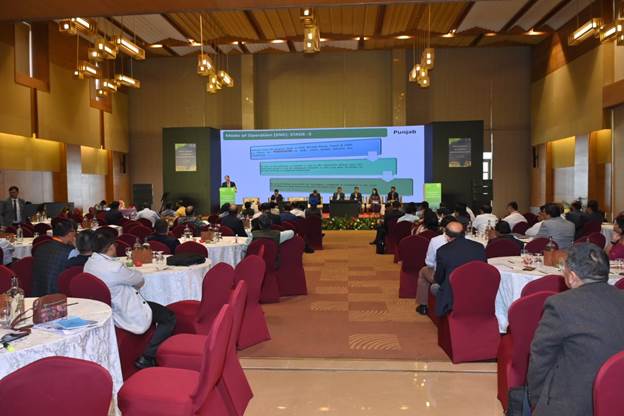
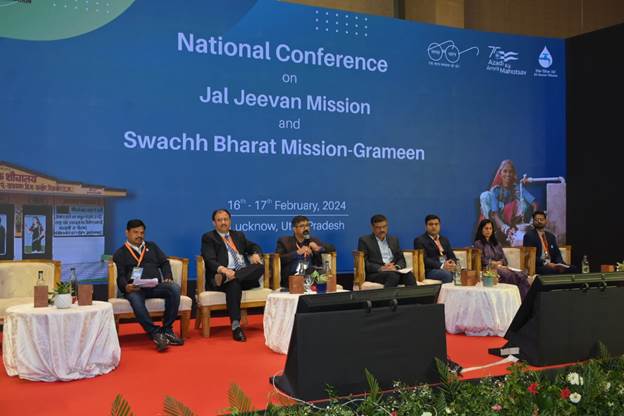
Day 2 saw an engaging line-up of sessions broadly covering the following topics:
- Operation and Maintenance of Rural Water Schemes
- Skilling of manpower
- Citizen Feedback, grievance redressal and Service level KPIs
- Water Quality SOP- discussion with the States/ UTs
Highlighting the importance of source sustainability, Shri Chandra Bhushan Kumar, AS&MD-NJJM, underscored how quality testing at the source can enhance water system management. He also spoke towards devising workable solutions and urged the states to focus on quantity and quality at the same time. He also said that interventions must be made to assure quality at the source.
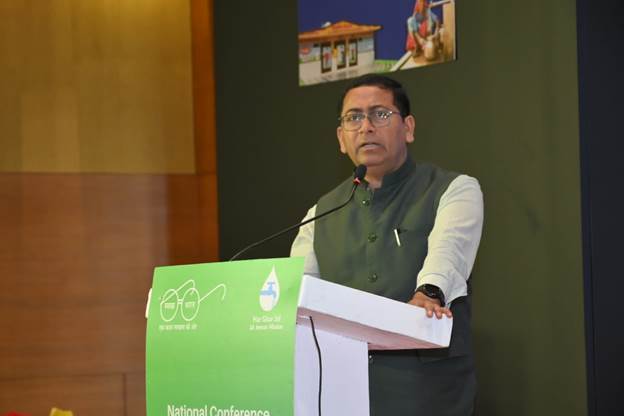
States/ UTs shared their diverse perspectives through a series of presentations on source sustainability, Nal Jal Mitra Programme (NJMP) and on Recognition of Prior Learning (RPL) – an alternate pathway of NJMP. CEO-Water Management and Plumbing Skill Council made a detailed presentation on NJMP and its alternate pathway – RPL and Up-skilling, followed by Q&A.
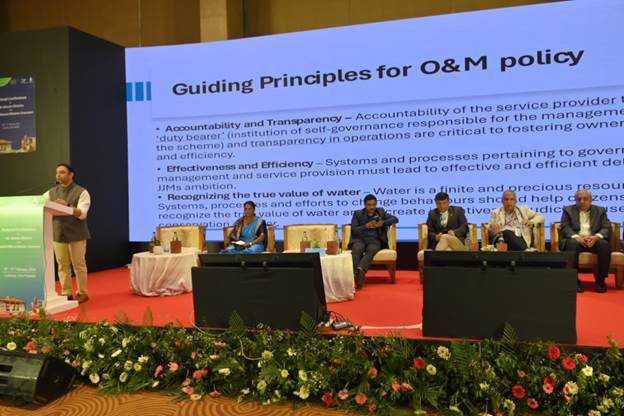
Arunachal Pradesh was appreciated for attaining 100% coverage, now taking the total number of States/ UTs with 100% saturation to 10. Jharkhand shared how Jal Jeevan Mission has become a women-led movement in the state with the help of Jal Sahiyas – women who are capacitated and trained to conduct water quality tests.
Nalina, a JJM beneficiary from the state of Karnataka shared how her village is a perfect success story under JJM. She said that with 490 households, and all of them Har Ghar Jal, the hamlet now has women who are relieved from the brunt of water scarcity, children are attending schools regularly in large numbers and water-borne diseases have minimised.
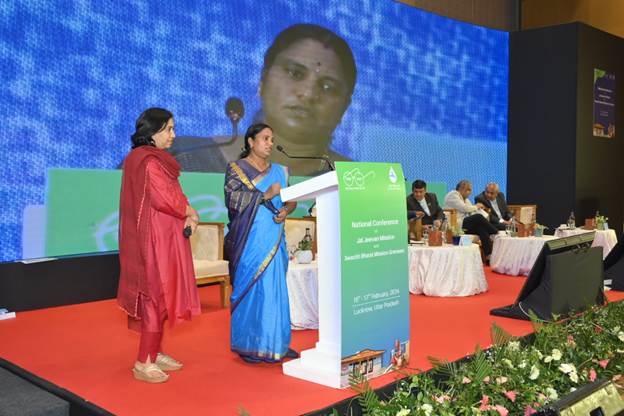
In the latter part of the day, discussions remained focussed on Citizen Feedback, Grievance Redressal and Service Level KPIs – underscoring these elements as fundamental to the sustainability of Jal Jeevan Mission. Village Sailam in Mizoram was cited as a suitable example of sustainable Har Ghar Jal. Tripura presented on the Best practice on multi-skilling capsule training of locals under Nal Jal Mitra Programme.
The deliberations led to highlighting the need to have an organised and closely monitored disinfection system to ensure water quality. Appropriate cost-effective methods to achieve disinfection were also discussed to address this need.
A session, chaired by Secretary – DDWS, was opened to deliberations and discussions on challenges and the way forward. Questions were asked about taking the O&M policies forward and how to tailor to specific needs, how these policies can be mapped across all critical verticals of the Rural Water Supply Scheme (RWSS) created under JJM in States/UTs.
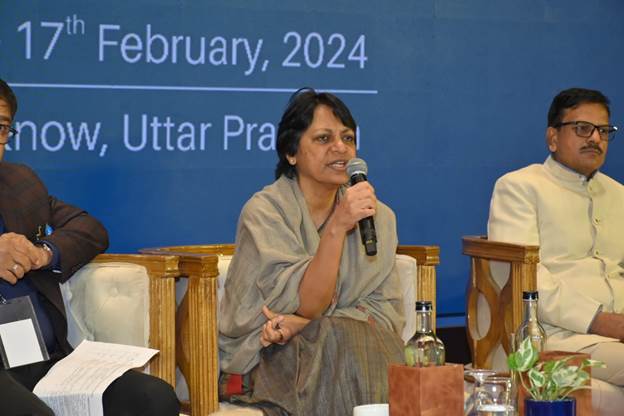
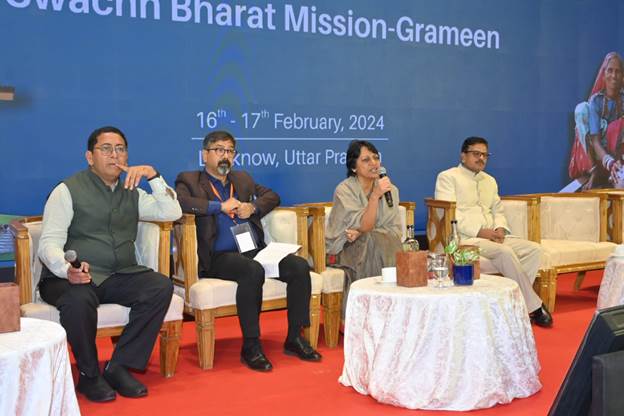
The Digital Display remained one of the highlights on the second day of the conference as well. It provided the participants with a comprehensive overview of Jal Jeevan Mission and its progress in these four years since 2019. It also covered other facets of the Mission like success stories from the ground, water quality and best practices from various States/ UTs.
The eventful day ended with the summing up of the conference. Smt. Vini Mahajan urged the states to continue stepping up the pace to provide drinking water to rural households and thanked the participants for attending the event. Smt. Mahajan also thanked the State Govt. of Uttar Pradesh for hosting the conference.
Jal Jeevan Mission, on date, has reached 14.33 crore rural households with tap water connections.
The accomplishment indicates substantial progress toward universal coverage in rural areas. With this, it is inching closer towards ensuring last mile connectivity. At this stage, it is imperative for States/ UTs to focus on attaining the objectives of JJM with renewed vigour and determination. Jal Jeevan Mission is indeed transforming the rural landscape and propelling India into a future defined by socio-economic development and growth.

